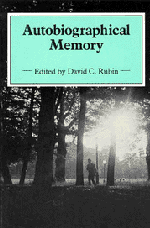Book contents
- Frontmatter
- Contents
- List of contributors
- Preface
- Part I Overview
- Part II Historical, theoretical, and methodological contexts for the study of autobiographical memory
- Part III The general organization of autobiographical memory
- Part IV The temporal organization of autobiographical memory
- Part V Temporal distributions of autobiographical memories
- 11 Childhood amnesia: an empirical demonstration
- 12 Autobiographical memory across the lifespan
- Part VI Failures of autobiographical memory
- Author index
- Subject index
11 - Childhood amnesia: an empirical demonstration
Published online by Cambridge University Press: 01 March 2011
- Frontmatter
- Contents
- List of contributors
- Preface
- Part I Overview
- Part II Historical, theoretical, and methodological contexts for the study of autobiographical memory
- Part III The general organization of autobiographical memory
- Part IV The temporal organization of autobiographical memory
- Part V Temporal distributions of autobiographical memories
- 11 Childhood amnesia: an empirical demonstration
- 12 Autobiographical memory across the lifespan
- Part VI Failures of autobiographical memory
- Author index
- Subject index
Summary
Long before Freud introduced the notion of childhood amnesia, literary figures including Rousseau and Tolstoy had testified to the paucity of early memories (Salaman, 1970). Nevertheless, Freud's (1916/1953b, Vol. 16, p. 326) observation of a unique form of forgetting “which veils our earliest youth from us and makes us strangers to it” was probably the first description published in conjunction with an elaborate theoretical explanation. Freud noted that from the ages of 6 to 8 and younger there are few memories, if any at all. Those early memories that do exist are considered “screen memories” in Freud's theory, hiding an emotionally significant event behind the guise of triviality. “A person's earliest childhood memories seem frequently to have preserved what is indifferent and unimportant, whereas (frequently, though certainly not universally) no trace is found in an adult's memory of impressions dating from that time which are important, impressive and rich in affect” (1901/1953, Vol. 6, p. 43). Memory gaps and distortions constitute an important data base for Freud's inferences about infantile sexuality and the mechanism of repression (Kline, 1972), and childhood amnesia has been implicated in the etiology of numerous psychopathological conditions (Freud, 1901/1953a; Krohn, 1978). Consequently, childhood memories, their absence or their distortion, deserve investigation from a clinical and experimental standpoint. In addition, if an amnesia were proven to exist, then theories of long-term memory would need to be modified to encompass this phenomenon.
- Type
- Chapter
- Information
- Autobiographical Memory , pp. 191 - 201Publisher: Cambridge University PressPrint publication year: 1986
Accessibility information
- 58
- Cited by

